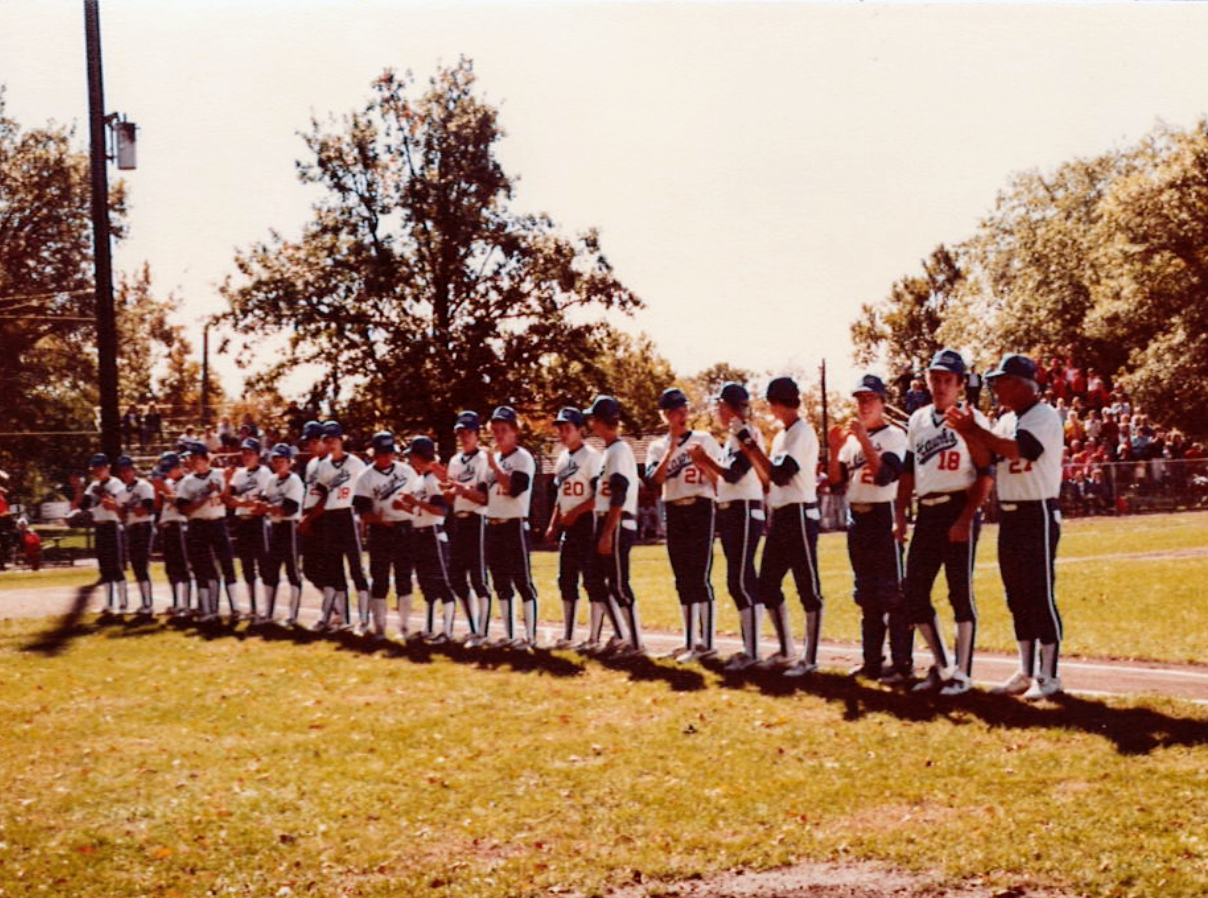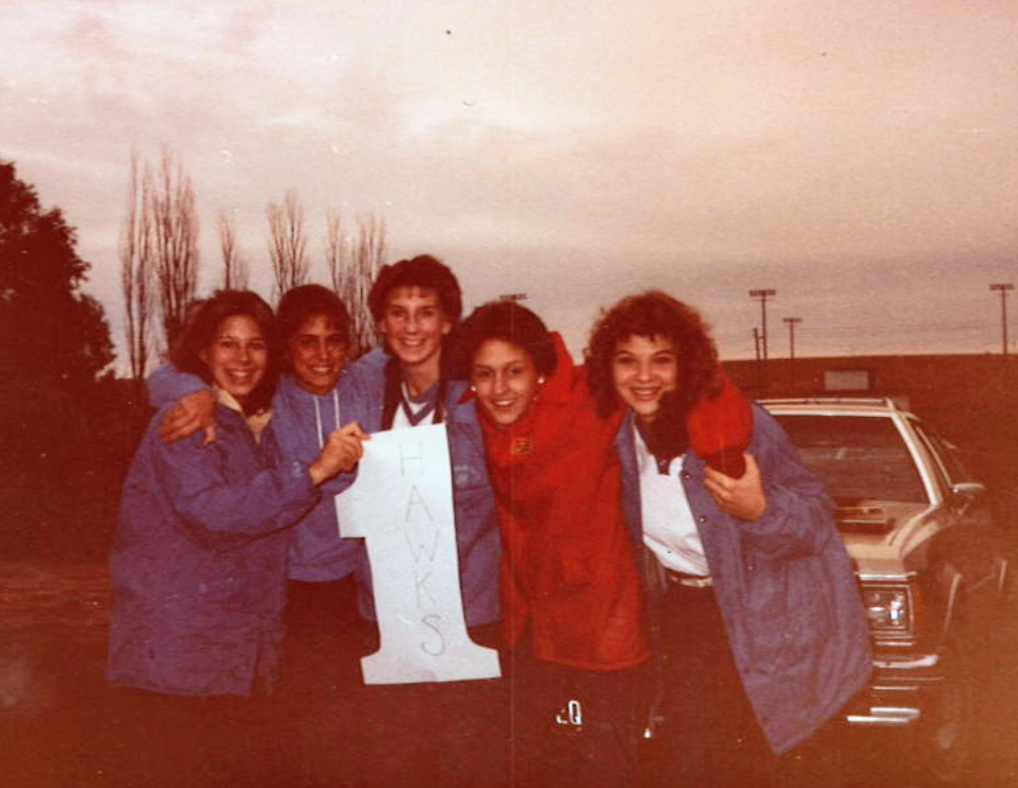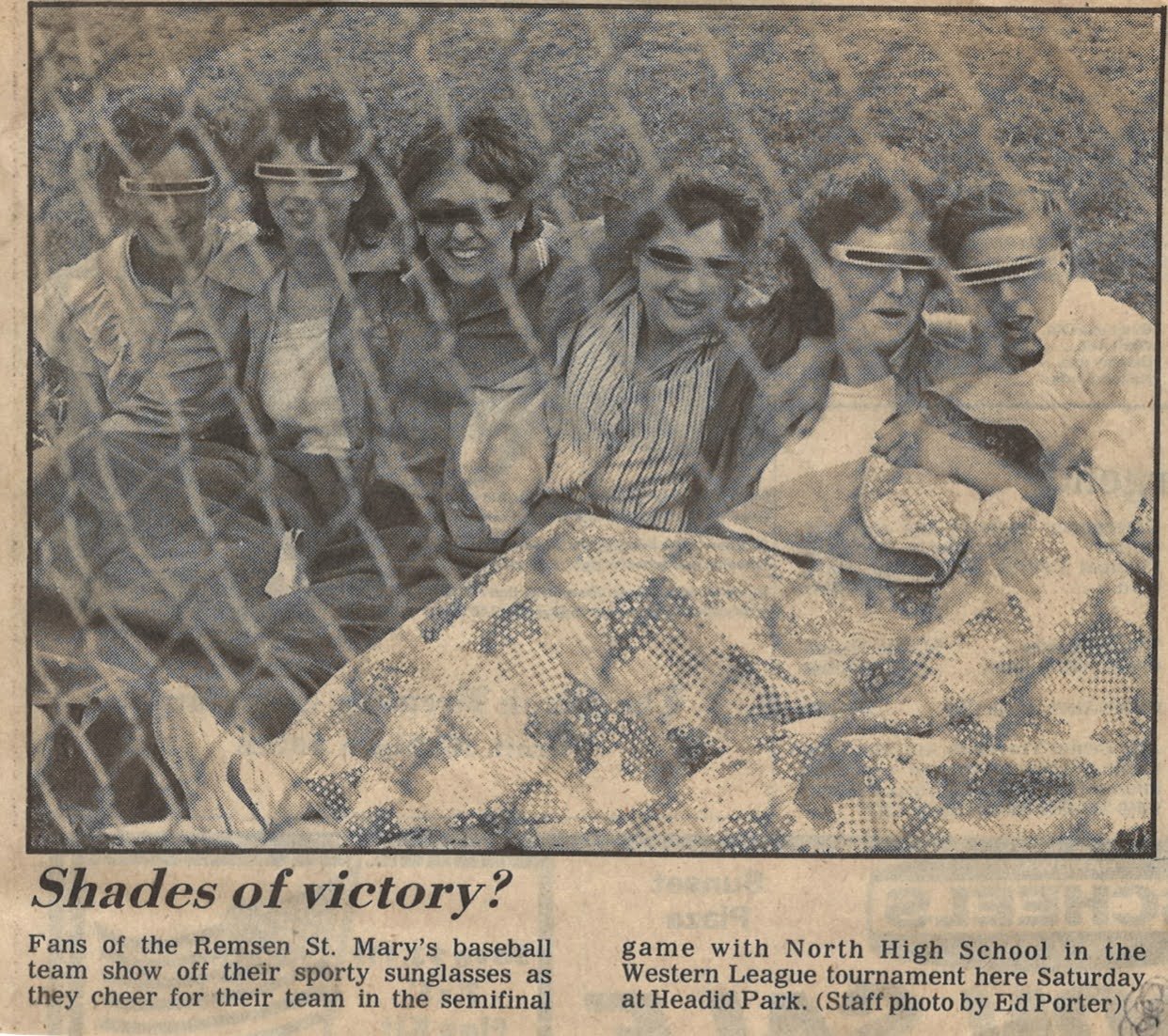The Boys of Summer
Remsen St. Mary’s - 1981 Fall Baseball Champions
It is impossible for me to think back to my childhood summers without associating them with baseball. A dusty field full of dirty boys strategically built next to our town swimming pool fills my memory. My small town of Remsen, Iowa is known for its baseball prowess, but that wasn’t always the case. Although individual baseball talent came out of our little town over the years, the success of great baseball teams began forming during those practices under the hot and humid Iowa skies in the 70s.
Perched on the east side of my hometown was our swimming pool. Built in the 50s, my mom can tell the tale of its construction and the joy it gave to her, her siblings, and neighborhood friends to have a municipal pool built on the open grassland just a short walk from her childhood home. A baseball field was built to the east of the pool later along with the addition of an adjoining park and tennis court. By the 70s, the pool had kept its allure with few cosmetic changes from the days of my mom’s pool initiation.
Weather-permitting (meaning: the pool was not closed due to lightning), the town pool was the place to be when the kids of Remsen were not working in the fields or tending to house chores. This is where we combined our coins to buy the best sugary and salty concessions that we shared. We would lay on our towels, drying off until the heat was unbearable. Then we would jump into the water until the sun called us back out to our towels again.
Through the giggles and splashing in the mid-afternoon sun, the girls would remain as groups of boys would scurry off to the changing room. Baseball practice lured them to the adjacent field looking down on the pool while we continued our water play below. Romping in the pool and eating our saltwater taffy, we looked for attention from the field above, but the boys had moved on. Baseball now had their full attention.
As middle school girls, we were not quite filling out our swimsuits, but we were starting to notice the boys as not just friends but the opposite sex. We began spending more time wrapped in our towels in the bleachers, drying off there rather than in the fenced pool deck. We would watch the boys as they took turns rounding the bases and catching fly balls. Our trips to the concession stand continued with us eating our popcorn in the stands, discussing which boy was our current crush. As spectators, we began to feel the awe of a homerun soaring over the fence and the art of a well-caught foul ball.
By game time in the evenings, we would be showered and dressed, joining the adults in the stands to cheer on our boy counterparts. With the population of our town a mere 1,500 people, my friends and I knew every boy on the field. These baseball players, our boys of summer, were our friends, brothers, neighbors, and brothers of friends. We all closely lived our lives together, outside the game of baseball.
By the late 70s, the thrill of baseball wins began moving outside our small town. My classmates were winning little league baseball championships in cities outside of our town limits. Our high school team began its appearances in state tournaments. When I would tell strangers I was from Remsen, Iowa, they would comment on our baseball abilities. This was the start of our being known as a baseball town.
Remsen St. Mary’s was my school, one of two in our town. With our already small pool of children separated between the private and public schools, the number of players to make a team was the first barrier. My graduating class of 1985 had a total of forty-four students (half of them boys). We were also a farm town with kids having obligations that made the long season of baseball games and practices during prime farm season a challenge. But the boys who wanted to play made it happen. They showed up and put in the time. Whether this came from small-town upbringings or good coaching (or likely a combination of both), the boys of summer wore their uniforms with pride. There was no complaining about the hours they put in on and off the field.
With 8th-grade graduation also came a move for the baseball players from the little league field by the pool to the larger high school field just across the street. Still a short walk to the pool and the pool concession stand, me and my friends started strategically planning our pool outings to correspond with practice times. We knew the boys would be over after practice for a cool-down fountain drink or a jump in the pool.
Although both of my brothers played little league ball, only my oldest brother, Matt, continued playing on the high school field. My brother, Mark, instead preferred working in the fields of corn. Matt enjoyed sports. A leader on the track, he was often used as a designated runner. Matt would run the bases for the better hitters who were slower than him. It took a team, not just the starters, to bring in the wins.
As we began high school, my classmates who were once talented little leaguers were now winning games at the high school level. Our first two school state championships in baseball came from our 1980 and 1981 fall teams. Note the word fall, not summer in the description of these titles. Remsen St. Mary’s High School did not have a football team and instead competed in fall baseball. Although football was later added long after my graduation, in the 80s the boys’ fall sport was baseball. Now instead of waiting to meet up with our baseball friends at the pool, we were instead getting permission slips to take chartered buses to state championship games far from our hometown.
By 1983 we were not only winning the fall state championships but the summer ones as well. With summer play more competitive, the boys of summer demonstrated how all the effort on the practice field paid off on game day. Our team was not only winning against the small-town schools, but we were now beating teams from Class A city schools as well. Our identity as a baseball powerhouse was deeply seated across Iowa in the 80s.
The team kept winning and we progressed in our role as dedicated fans. As the players’ classmates and friends, we followed them as their most loyal supporters. Making signs with magic markers, we joined the downtown fanfare of firetrucks filled with winning players. Sirens rang through the town as the residents poured along the main street to welcome our victorious boys home.
Our fan base posse acquired driver’s licenses by our junior year and we now were able to follow the full baseball schedule, home and away. If we weren’t working, we hopped in cars drinking cans of Tab and chewing bubble gum. With windows down and feathered hair flying, we drove to watch our favorite team. We had officially graduated from pool concession popcorn to consuming large bags of sunflower seeds (and occasional cans of snuck-in beer).
By my senior year, I became more curious about the game and bought a baseball scorebook. I saw other people doing this in the stands and was intrigued. I would sit in the outfield, carefully logging in stats after each play. I learned a lot from keeping stats. I could now predict how the starting lineup would look for the next game and why Coach Marv Thelen would signal the outfield to come in closer to the infield when a particular opposing player was up to bat.
Although Coach didn’t pay much attention to the teenage girls lining the outfield (some catching sun in bikini tops), I did feel he thought of us as just a nuisance. We were merely a temptation to the boys whose focus needed to remain on the field and not on the less important matters off the field (us). From the bleachers, I learned to appreciate Coach Thelen. I admired his wins but saw the respect he garnered from his players. His focus on team rather than individuals was even apparent to my teenage brain.
If we couldn’t attend the game, we would wait for the team bus to arrive back at the high school. Congregating at the grocery store parking lot, we would wait for the baseball boys to join, win or lose. Downing a soda from the store’s outdoor pop machine, they updated us on the game outcome with dirt-stained baseball pants as evidence of their play.
Championship games and wins continued through my senior year with my classmates’ final baseball appearance producing a win in the summer of 1985. As the newly graduated non-playing classmates, we were able to secure hotel rooms to watch the boys play their last high school game together. With our new status of independence, we celebrated into the night, happily cracking Bud Lights with no fear of getting caught and sent to the principal’s office.
In a turn of life events, my parents decided to move to Arizona the next year. With my brothers also living away from Remsen, I found myself with no reason to come back. Unknown to me at the time, that 1985 championship game would be the last St. Mary’s baseball game I would attend. My times at the Remsen pool and baseball fields were now just cherished memories boxed up in my brain labeled ‘summers of the 70s and 80s’.
I later raised my three boys in Nebraska. All three of them enjoyed summers on the baseball field to varying degrees of statistical success. But the common theme was that their best memories as players were those seasons played with their friends while being coached as a cohesive team. The select team tryouts among strangers are a distant memory but the winning home run by their buddy, a bench-warmer, is a story brought up often.
Now with my years as a little league spectator behind me, I still love to catch a professional baseball game when I am in a city with a team. If there is a scheduled home game with available tickets during my stay, I am in.
People sometimes ask if I actually enjoy watching baseball. The comments are varied on why they do not.
“It’s such a long season.”
“The games go on forever.”
But I disagree. Take me out to the ballpark any day. I love the feel of the hot sun warming my arms with a cold beer cooling my hand. Reading the stats on the giant scoreboard backdrop, I gather insight on each player at bat from current season standings to the college where they played ball. There is a rich history of baseball behind every player having a spot in the MLB.
But most importantly, there is one thing I know about them that doesn’t hit the giant scoreboard. Once upon a time, in their own hometown, they too were one of the boys of summer.







